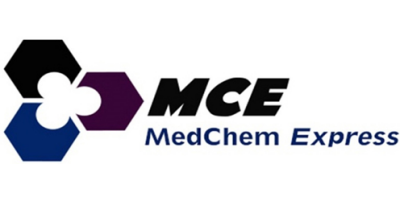

- Home
- Companies
- MedChemExpress LLC (MCE)
- Products
- MedChemExpress - Model Kartogenin - ...
MedChemExpress - Model Kartogenin - 4727-31-5
Kartogenin (KGN) is an inducer of chondrogenic tissue formation (EC50: 100 nM). Kartogenin induces chondrogenesis by binding to fibrin A, disrupting its interaction with the transcription factor core binding factor beta subunit (CBFβ), and by modulating the CBFβ-RUNX1 transcriptional program. Kartogenin also promotes tendon-bone junction (TBJ) wound healing by stimulating collagen synthesis. Kartogenin is widely used in cell-free therapy in the field of regeneration for cartilage regeneration and protection, tendon-bone healing, wound healing and limb development. Kartogenin promotes cartilage repair, coordinates limb development, and is also used in osteoarthritis (OA) research[1][2][3][4].MCE products for research use only. We do not sell to patients.
Kartogenin
MCE China:Kartogenin
Brand:MedChemExpress (MCE)
Cat. No.HY-16268
CAS:4727-31-5
Synonyms:KGN
Purity:98.45%
Storage:Powder -20°C 3 years 4°C 2 years In solvent -80°C 6 months -20°C 1 month
Shipping:Room temperature in continental US; may vary elsewhere.
Description:Kartogenin (KGN) is an inducer of chondrogenic tissue formation (EC50: 100 nM). Kartogenin induces chondrogenesis by binding to fibrin A, disrupting its interaction with the transcription factor core binding factor beta subunit (CBFβ), and by modulating the CBFβ-RUNX1 transcriptional program. Kartogenin also promotes tendon-bone junction (TBJ) wound healing by stimulating collagen synthesis. Kartogenin is widely used in cell-free therapy in the field of regeneration for cartilage regeneration and protection, tendon-bone healing, wound healing and limb development. Kartogenin promotes cartilage repair, coordinates limb development, and is also used in osteoarthritis (OA) research.
In Vitro:Kartogenin (100 nM; 72 h) induces chondrocyte nodule formation in primary hMSCs[1].Kartogenin (10 nM-10 μM; 72 h) increases chondrocyte-specific gene expression in hMSCs[1].Kartogenin (0.12-10 μM; 48 h) inhibits nitric oxide (NO) and glycosaminoglycan (GAG) release induced by cytokines in primary bovine articular chondrocytes[1].Kartogenin (50-5000 nM; 2 weeks) induces the chondrogenetic differentiation of the BMSCs in a concentration-dependent manner[2].
In Vivo:Kartogenin (10 μM in 4 μL of saline; i.a. on days 7 and 21) promotes cartilag erepair in collagenase VII-induced OA models in mice[1].
Animal Administration:Rats: Then rats are divided into two groups based on the injections received: six rats are given 10 µL saline injections in each wound (wound-only group) and six rats receive 10 µL of 100 µM kartogenin solution each in the wounded areas (wound+kartogenin group). The injections are given immediately after wounding and repeated on days 2, 4, 7 and 12[1].
Cell Assay:Rabbit BMSCs or PTSCs are treated with various concentrations (1 nM to 5 μM) of kartogenin. The medium is changed every 3 days and after 2 weeks, cell proliferation is measured by population doubling time[1].
Hot selling product:Ginsenoside Rh2 | PMSF | GW3965 (hydrochloride) | Sodium 4-phenylbutyrate | 2-Hydroxy Atorvastatin-d5 (disodium) | Erlotinib | Elinzanetant | TBHQ | GSK2795039 | Relatlimab
Trending products:Recombinant Proteins | Bioactive Screening Libraries | Natural Products | Fluorescent Dye | PROTAC | Isotope-Labeled Compounds | Oligonucleotides
References:
[1]. Johnson K, et, al. A stem cell-based approach to cartilage repair. Science. 2012 May 11;336(6082):717-21. [Content Brief]
[2]. Liu F, et, al. A novel kartogenin-platelet-rich plasma gel enhances chondrogenesis of bone marrow mesenchymal stem cells in vitro and promotes wounded meniscus healing in vivo. Stem Cell Res Ther. 2019 Jul 8;10(1):201. [Content Brief]
Brand introduction:
• MCE (MedChemExpress) has a global exclusive compound library of more than 200 kinds, and we are committed to providing the most comprehensive range of high-quality small molecule active compounds for scientific research customers around the world;
• More than 50,000 highly selective inhibitors and agonists are involved in various popular signaling pathways and disease areas;
• The products cover a variety of recombinant proteins, peptides, commonly used kits, more PROTAC, ADC and other characteristic products, widely used in new drug research and development, life science and other scientific research projects;
• Provide virtual screening, ion channel screening, metabolomics analysis detection analysis, drug screening and other professional technical services;
• It has a professional experimental center and strict quality control and verification system;
• Provide LC/MS, NMR, HPLC, chiral analysis, elemental analysis and other quality inspection reports to ensure the high purity and high quality of products;
• The biological activity of the products has been verified by the experiments of customers in various countries;
• A variety of top journals such as Nature, Cell, Science and pharmaceutical patents have included the scientific research results of MCE customers;
• Our professional team tracks the latest pharmaceutical and life science research and provides you with the latest active compounds in the world;
• It has established long-term cooperation with the world's major pharmaceutical companies and well-known scientific research institutions。
